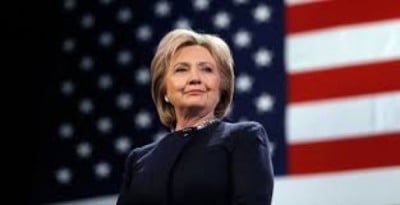“So We have Two Hillary Clintons”… Wikileaks and Hillary Clinton’s View on Banking, Finance and Trade

“So we have two Hillary Clintons, which says we have a person who is a liar.” — Rudy Giuliani, The Guardian, Oct 9, 2016
Again, WikiLeaks made its sniping foray into the US election with ample juicy material prior to the second presidential debate, this time revealing excerpts of paid speeches shedding light on Hillary Clinton’s view on banking, finance and trade.
These are particularly pertinent because they show, consistently, how the Democratic nominee for the White House remains at odds on her current trade stance to what has essentially been a Weltanschauung of corporate freedom at the expense of state control.
Behind the scenes, before an audience that has remunerated her to be friendly and benevolent to the corporate sector, Secretary Clinton has shown herself to be very partial to sympathy and praise. In public, she has attempted to mine the populist storm against corporate elites and the sapping dangers of free trade. In private, she has fawned and placated.
What matters in these excerpts is a vision entirely consistent with the Clinton duo, which have functioned over the years as annexes of corporate representation in US politics. As she explained to Brazilian bankers in May 2013, dreams of “a hemispheric common market, with open trade and open borders, sometime in the future with energy that is green and sustainable,” preoccupied her.[1]
Even such figures as Vice President Joe Biden have accepted the premise that the destruction of middle-class financial security in this now very broken Republic began during “the later years of the Clinton administration” rather than during the reckless dark reign of George W. Bush. By that point, the rot had essentially hobbled middle America.
Managed appearances have proven to be the acme of the candidate’s approach, a point that has troubled Clinton aide and campaign strategist Robby Mook. The persistent, seemingly irresistible link with Goldman Sachs, which has hosted events for the Clinton Foundation with the enthusiasm of Beelzebub’s minions, has niggled him. In a message to Clinton’s campaign manager Chairman John Podesta on May 10, 2014, Mook “flagged” the point that “it’s a little troubling that Goldman Sachs was selected for the [Clinton] foundation event.”[2]
The Podesta stash available on WikiLeaks is riddled with confessionals and loves notes with big banks and the board room. This stands to reason: the Clintons see power oozing out of officials otherwise unaccountable to the great unwashed in democracy.
To that end, there are an ample number of paid speeches to the corporate sector, much of this connected with addresses given to various branches of that less than wonderful doyen of muscular finance. Occasionally, they become autobiographically frank.
Clinton’s remarks in February 2014 reflect on her distancing from “the struggles of the middle class”. Having lived what she regarded as a fairly prosaic middle class life, one with its “accessible health care” and a father sceptical of “big business and big government”, Clinton now felt an astral detachment, even though she had not “forgotten” her previous faux humbleness.
The extent of that void is evident in her pointed observations to Deutsche Bank (October 7, 2014) which suggest a formula of self-correction for financial naughtiness within the industry itself. One had, like President Teddy Roosevelt, to avoid unleashing the forces of nationalism and populism. The solution here? Let representatives of the banking industry find their own. “And I really believe that our country and all of you are up to that job.”[3]
There is room to issue sallies against the disgruntled. Her speech (Oct 29, 2013) to the Goldman Sachs Buildings and Innovators Summit speaks about those wretches who have evident biases “against people who have led successful and/or complicated lives.” Such matters as divesting assets, “stripping all kinds of positions, the sale of stocks” were all “very onerous and unnecessary”. Truly, criminality can be a complex business.
That same month, Clinton appeared at the Goldman Sachs AIMS Alternative Investments Symposium (Oct 24, 2013) to suggest that the bankster phenomenon in the United States had been misunderstood and simplified. There had been terrible “misunderstanding” and “politicizing” in place of “greater openness on all sides”.[4]
Throughout her political life, the face of Clinton’s strategizing is evident. She stresses the need for having different positions, sometimes a different one in public from that in private, a point made in an April 24, 2013 speech to the National Multi-Housing Council. “You have to sort of figure out how to – getting back to that word, balance – how to balance the public and the private efforts that are necessary to be successful, politically, and that’s not just a comment about today.”[5]
The rich pickings of the Podesta files again took the Clinton campaign off guard. A particularly clumsy retaliation was suggested by Vice Presidential running mate Tim Kaine. To CNN he claimed ignorance, having not approached the presidential hopeful before making observations about claimed authenticity. “I have no way of knowing the accuracy of documents dumped by this hacking organization.” Having asserted this as true, he then suggested you could not “accept as gospel truth anything they put in a document.”
Mook, who should be getting rather used to these things, seemed even less adept than his previous efforts. Again, the campaign, in vain attempts to navigate Clinton’s traumatised approach to fact, finds itself stumbling. The one certainty that has good chance of becoming fact is that the banks will know that a Clinton administration will do little for reform and much to untether the Prometheus of Wall Street.
Dr. Binoy Kampmark was a Commonwealth Scholar at Selwyn College, Cambridge. He lectures at RMIT University, Melbourne. Email: [email protected]
Notes
[1] https://wikileaks.org/podesta-emails/emailid/927
[2] https://wikileaks.org/podesta-emails/emailid/1381
[3] https://wikileaks.org/podesta-emails/emailid/927
[4] https://wikileaks.org/podesta-emails/emailid/927
[5] https://wikileaks.org/podesta-

